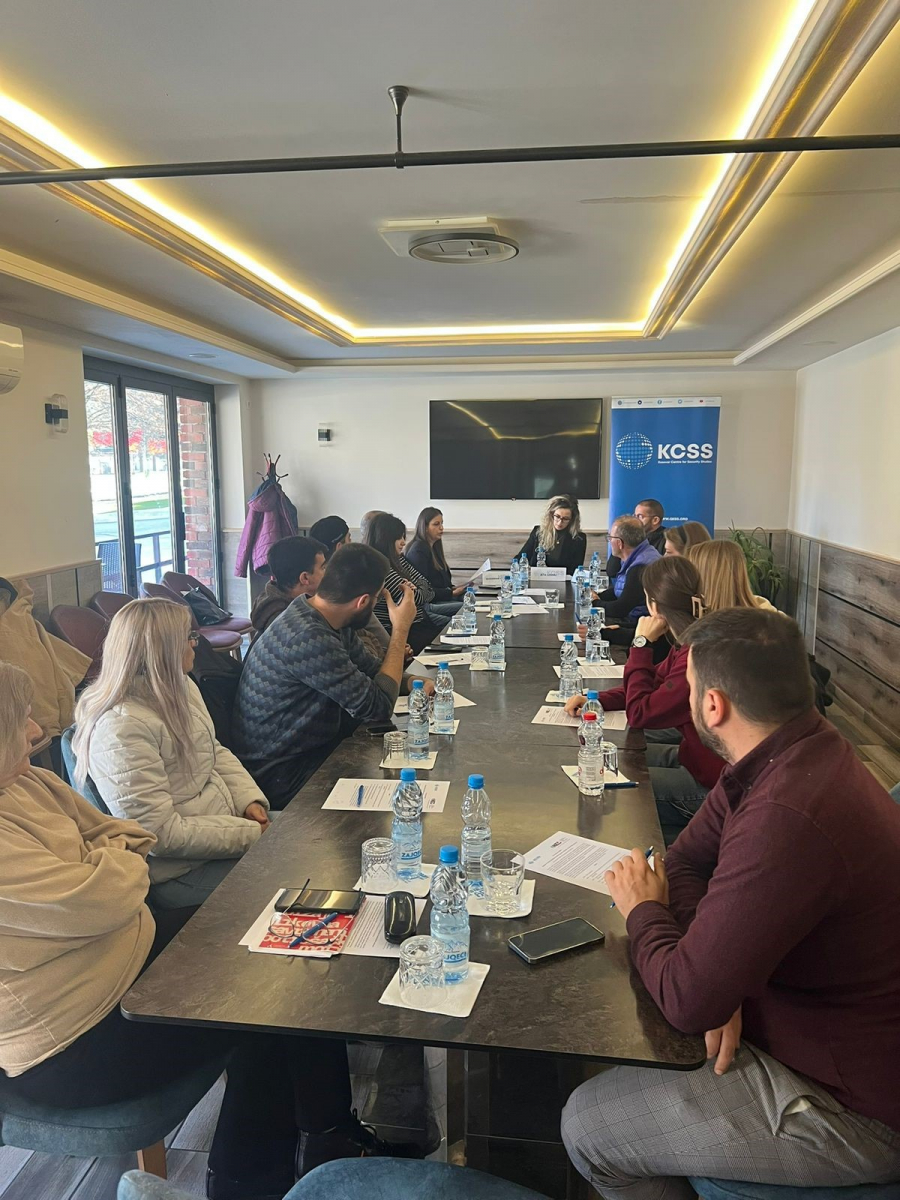2/12/2024

On November 27th, 2024, the Kosovar Center for Security Studies (KCSS) organized a community roundtable in the municipality of Kamenica on the topic of fostering and maintaining interethnic communication and understanding. The event's focus was to address and explore the success of Kamenica as a municipality where three communities, mainly Albanian, Serbian, and Roma, live together integrated, and how they tackle disinformation – a phenomenon that seems to increasingly exacerbate interethnic perceptions.
The event brought together local leaders, NGO representatives, and community members, highlighting the unique dynamics in Kamenica, a municipality well-known for its inclusive atmosphere even during challenging times. The discussion was moderated by Jeta Loshaj, Project Coordinator at KCSS, whereas the two other panelists were Aleksandra Jovanović, Deputy Mayor for Communities at the Municipality of Kamenica, and Ardian Berisha, Activist and Head of the Council for Local Youth Action at the Municipality of Kamenica.
This activity is part of a larger project supported by the National Endowment for Democracy (NED), titled “Increasing Government Transparency and Accountability in Interethnic Dialogue.”
Addressing Shared Challenges
During the discussion, there was a widely shared consensus that Kamenica is characterized for good interethnic communication and that its citizens are not affected by news or political events that seem to be aiming to damage the multiethnic composition of Kosovo. What concerns the citizens of Kamenica the most is not the fear or the perception of increased tensions, but rather the lack of economic perspectives in the town they live in, which is a concern and a shared challenge among everyone and goes beyond issues of ethnicity, race, or religion.
A prominent member of the community, Ardian Berisha, stressed the shared struggles among ethnic groups, noting that priorities may differ, but the challenges often overlap. He recalled that in the past, collaboration between Albanians and Serbs was stigmatized, but today, such partnerships are critical for progress. Another member of the Albanian community, a high school student and NGO worker shared her perspective as a young person in Kamenica. She expressed that while the town is peaceful and inclusive, it lacks opportunities for higher education and employment, prompting many young people to leave. A member of the Serbian community, a local language teacher, and an artist echoed these concerns, emphasizing that unemployment is a significant issue for all communities, not just Serbs. A noted contributor in these challenges is the privatization of companies, the lack of workers in this municipality and that the profit range is much more different in Prishtina than Kamenica.
Highlighted Positives
One of the participants praised the history of interethnic cooperation in Kamenica, mentioning the example of a farmers’ market that even during the conflict was maintained by the municipality where all communities participated. Another group member, an administrative worker, supported this claim, describing Kamenica as a place where she feels safe, noting that she never felt unsafe walking alone at night. The discussion also touched on successful initiatives, such as the flower shop project initiated by the Roma community members, mentioned by the participants from the NGO “Luludi”, supported by the EU and the Municipality.
The Role of Language
Language emerged as a recurring theme in the discussions. Participants highlighted its dual role as a barrier and a bridge in fostering interethnic understanding. Agnesa Bytyçi, an intern at KCSS shared her experience growing up in Prizren, where speaking multiple languages was normalized. While a participant from the Serbian community, administrative personnel in a Government Institution in Kamenica, and one of the high school students from the Albanian community, noted the efforts made to learn each other’s languages through courses or informal exchanges. The local language teacher added that Serbian youth are increasingly interested in learning Albanian to improve communication, though similar enthusiasm from the Albanian side is less common.
Tackling Disinformation
The conversation progressed to the impact of disinformation on interethnic relations. Participants, including Mr. Berisha and a journalist from Gjilan, discussed how fake news exacerbates tensions, particularly when stereotypes and historical grievances are manipulated. The representative of the Albanian community pointed out that the persistence of hatred from past conflicts often fuels the spread of fake news, as people interpret information through biased lenses. Suggestions, coming from all the representatives, for combating this issue included fostering critical thinking, ensuring news is evidence-based, and encouraging young people to meet more often and build trust.
It is also worth mentioning that a more critical addressing of the past was proposed, where young people are taught about the past in a constructive way, rather than a hateful one. Both sides agreed that ignoring the past would do more damage.
Moving Forward
In the concluding session, the participants discussed the ways to improve interethnic relations. One of the participants emphasized the importance of creating opportunities for young people to interact, while the deputy mayor called for collective efforts to tackle unemployment as a shared goal. The discussion ended on a hopeful note, with a commitment to fostering respect and collaboration across all communities.
This community roundtable was the first out of six roundtables planned to take place across different municipalities in Kosovo, which are part of the project supported by National Endowment for Democracy (NED). This project will be implemented throughout 2024/2025 and aims to provide an insightful and comprehensive overview of the state of interethnic relations in Kosovo with the ultimate objective of suggesting the way forward for a sustainable, inclusive, and open dialogue between interethnic communities, government institutions, and the civil society in Kosovo.